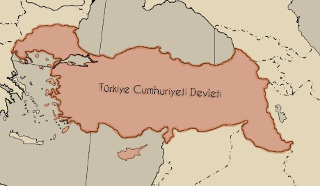If you look at the ISIS-held city of Mosul on a map, you’ll find it in Iraqi territory. There also remain substantial Kurdish claims in the area, which have been growing as the Peshmerga annexes territory in the area. Less discussed, at least in the last 90+ years, is Turkey’s claims.
 In the wake of WW1, one of the biggest territorial issues to be settled was “the Mosul Question,” where both Turkey and Britain claimed all of present-day northern Iraq, including Mosul, Irbil, and Kirkuk. Turkish President Recep Tayyip Erdogan today cited the Misak-i Milli as part of their determination to be involved in fighting ISIS in Mosul.
In the wake of WW1, one of the biggest territorial issues to be settled was “the Mosul Question,” where both Turkey and Britain claimed all of present-day northern Iraq, including Mosul, Irbil, and Kirkuk. Turkish President Recep Tayyip Erdogan today cited the Misak-i Milli as part of their determination to be involved in fighting ISIS in Mosul.
The Misak-i Milli was a 1920 decision by the Ottoman Parliament, which among other things defined the territory of post-war Turkey, and it included the Mosul area, which had been Ottoman before the war. Britain, which wanted it as part of their colonial possessions, occupied Istanbul militarily and dissolved the parliament the following month.
The “Mosul Question” remained a major international diplomatic issue for years following this, after Turkey finally secured the Treaty of Lausanne, which affirmed their independence from the British and French-led occupation. Britain argued they’d occupied Mosul in WW1 and intended to keep it. Turkey noted the British troops didn’t actually enter Mosul until after an armistice had already been signed, ending the war.
The League of Nations ultimately agreed to give influential Britain control over the Mosul area in 1926, on condition that Turkey get 10% of the oil profits from the area for the next 25 years. This remained a sore spot for Turkey for some time.
Erdogan has long appealed to Ottoman era nationalism to justify his policies, but it is unclear how credible the rest of the participants in the Mosul invasion are going to take Erdogan’s appeals to a 1920 territorial claim as justifying his involvement as an unwelcome participant.


